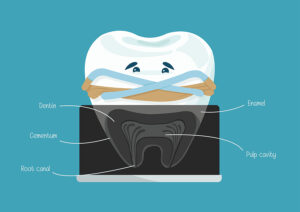Root canals, though often misunderstood, are a common dental procedure aimed at saving damaged teeth in kids and adults. Despite their prevalence, misconceptions surrounding root canals persist, leading to unnecessary fear and reluctance among parents whose kids need root canal treatment.
Understanding Root Canals
When it comes to your child’s dental health, understanding the process and benefits of kids’ root canals is key. Many parents harbor concerns about root canals, often fearing they cause discomfort for their little ones. However, the reality is quite the opposite. Kids’ root canals are procedures aimed at relieving pain and saving a tooth that has been compromised by decay or injury.
In this treatment, the dentist carefully removes the infected or damaged pulp inside your child’s tooth, cleans the area to rid it of any infection, and then seals it to prevent future problems. This process not only alleviates pain but also plays a critical role in maintaining the health of the tooth.
The need for a root canal in children often arises from deep decay, frequent dental procedures on the same tooth, or an injury that causes damage to the tooth’s inner pulp. Neglecting such issues can lead to more severe consequences, such as infection spreading to adjacent tissues, the formation of abscesses, the loss of bone around the tooth, and potentially, broader health issues.
Symptoms that may indicate your child needs a root canal include a severe toothache, prolonged sensitivity or pain in response to temperature changes, swelling or tenderness in the nearby gums, or a noticeable discoloration of the tooth. It’s crucial to consult a dentist promptly if your child shows any of these signs. Delaying care could lead to more complex dental problems and the need for more significant treatment down the line.
Common Myths About Root Canals
Myth #1: Root Canals Are Painful.
It’s understandable to worry about your child experiencing discomfort during dental treatments, but it’s essential to separate fact from fiction when it comes to root canals.
Contrary to popular belief, root canals are not inherently painful experiences for children. Dentistry has come a long way in terms of pain management techniques, and modern anesthesia ensures that your child remains comfortable and relaxed throughout the procedure. Pediatric dentists are trained to provide gentle and compassionate care.
Also, remember that the pain a child feels for a short time after getting a root canal may not be nearly as bad as the pain they will experience from a major tooth infection or abscess. By addressing the underlying issue promptly, root canal treatment can actually provide relief from pain and improve your child’s overall well-being.
Myth #2: Root Canals Cause Illnesses.
A common myth that often causes worry among parents is the belief that root canals can lead to other illnesses. This misconception stems from outdated research that suggested bacteria from root canals could cause diseases elsewhere in the body. Modern science, however, has thoroughly debunked this theory.
Research by dental and medical professionals, including the American Association of Endodontists, confirms that root canals are safe. These procedures are designed to remove bacteria from the infected tooth, preventing further decay or infection. With today’s sterile techniques and advanced disinfection methods, the risk of illness following a root canal is minimal.
Myth #3: Extraction Is Better.
The belief that extraction is a better option than a root canal is a common myth. However, saving a natural tooth through a root canal often offers benefits that extraction cannot. Root canals aim to remove infection while preserving the tooth’s structure. This allows for normal chewing and maintains the natural alignment of teeth. Such a preservation is crucial for oral health, as it prevents the surrounding teeth from shifting, which could lead to jaw pain and difficulties with biting or chewing.
On the other hand, tooth extraction can lead to its own set of complications. While sometimes necessary, extraction can result in shifting of the adjacent teeth, potential misalignment, and the need for dental implants or bridges to fill the gap. These solutions can be more costly and require additional dental work compared to a root canal, which maintains the original tooth.
Choosing a root canal over extraction when possible is often the preferred route for long-term dental health. It’s important for parents to understand the advantages of preserving natural teeth and the potential complications associated with extractions.
Myth #4: Root Canals Weaken Teeth.
There’s a myth that root canals weaken teeth, which understandably can cause concern for parents focusing on their child’s dental health. However, the truth is quite the opposite. Root canal procedures do not weaken teeth. They play a crucial role in preserving them.
During a root canal, the dentist removes the infected or damaged tissue from inside the tooth, cleans the area to eliminate bacteria, and then fills and seals the tooth. This process eliminates the infection and protects the tooth from further decay.
Some believe that after a root canal, a tooth becomes fragile and prone to breakage. However, with the advancements in dental techniques and materials, a properly performed root canal, followed by the placement of a crown or similar restoration, actually restores the tooth’s integrity.
Facts You Need to Know About Root Canals
Fact #1: Root Canals Save Teeth.
Root canals have a high success rate and are instrumental in saving teeth that might otherwise be lost to infection or decay. With modern dental techniques and technologies, the majority of teeth treated with root canal therapy remain healthy and functional for years, often lasting a lifetime. The procedure’s success rate is impressive, with studies showing that well over 90% of root canals are successful.
Statistics further underscore the longevity of root canal-treated teeth. They highlight that with proper care, including regular dental check-ups, good oral hygiene, and protective measures like crowns on treated teeth, these teeth can serve just as well as natural, untreated teeth. This longevity is crucial, as it helps maintain the patient’s natural bite, ensures the proper functioning of their teeth, and preserves the aesthetic appearance of their smile.
It’s a fact that root canals save teeth, offering a safe and reliable option for preserving natural teeth that might otherwise need to be removed.
Fact #1: They are Routine Dental Procedures.
Root canals are among the most routine dental procedures performed today, reflecting their importance in modern dentistry. Millions of root canal treatments are carried out each year. They effectively save teeth and alleviate pain that tooth decay or infection causes. This prevalence underscores not only the procedure’s importance but also its reliability as a standard treatment for preserving dental health.
The process of a typical root canal is straightforward and methodical. Initially, the dentist will take X-rays to assess the extent of the tooth decay or infection. Then, using local anesthesia to ensure the area is numb, the dentist will create a small opening in the top of the tooth to access the infected or damaged pulp inside.
The pulp, which contains nerves and blood vessels, is removed, and the space is thoroughly cleaned and disinfected to eliminate any bacteria. After cleaning, the tooth is filled with a biocompatible material and sealed to prevent any further infection. Finally, the tooth is often restored with a crown or filling for protection and to restore it to full function.
Fact #3: Proper Aftercare Is Crucial for Root Canal Success
Proper aftercare is essential to ensuring the success of a root canal treatment. Following the procedure, it’s important for patients, especially children, to adhere to specific care instructions to aid in healing and to prevent any complications.
Tips for post-treatment care include avoiding chewing on the treated tooth until it’s fully restored with a permanent filling or crown. Kids also need to maintain good oral hygiene by regularly brushing and flossing. Plus, they should avoid hard or sticky foods that could damage the temporary restoration.
Follow-up appointments are highly significant. These appointments allow the dentist to monitor the healing process. This ensures that the infection has been fully eradicated and that the tooth is functioning correctly. They also provide an opportunity to complete the restoration of the tooth with a permanent filling or crown, which is crucial for the tooth’s long-term health and stability.
Choose Kangaroo Smiles for Exceptional Pediatric Dental Care
At Kangaroo Smiles, we’ve meticulously designed our office to ensure you and your child feel completely at ease. Our décor features calm colors and engaging wall murals, along with interactive areas that keep children entertained and happy. For our parents, we offer the comfort of a coffee bar for that much-needed pick-me-up.
Expert Care with a Gentle Touch
Dr. Simon Beylin, our renowned root canal specialist, brings an unmatched level of expertise and compassion to pediatric dentistry. With his specialty training from Harvard School of Dental Medicine and extensive experience at the Children’s Hospital of Boston, Dr. Beylin stands out not only for his professional accomplishments but also for his genuine affection for working with children. He understands the nuances of treating young, permanent teeth, making him the trusted choice for your child’s root canal needs.
Schedule Your Visit Today
Don’t wait to give your child the best in dental care and root canal treatment. Schedule your appointment with Kangaroo Smiles in Methuen or Lowell and see firsthand the difference compassionate, expert care can make. Join us in our mission to turn dental visits into a fun and enriching experience for your child.




